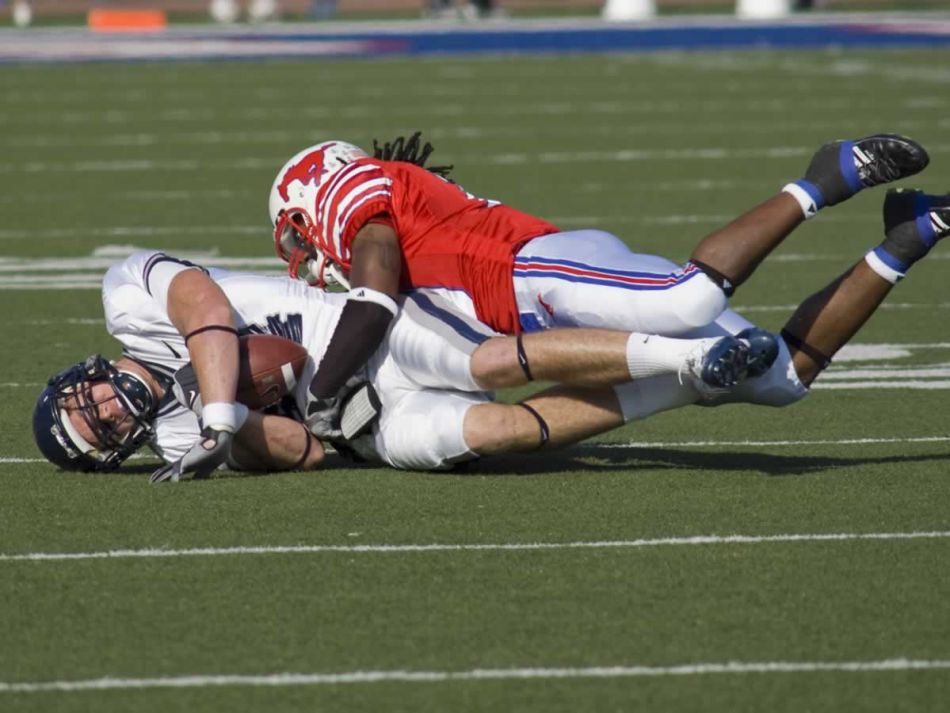Mamas, Don't Let Your Babies Grow up to be a Cowboy or a Canuck
Stacy Matson | Best of Best

image by: John McStravick
Football is an exciting, violent sport. And, no offense to the Aussies and Canadians, so is rugby and hockey. Head related injuries have always been part of the game. But do they need to?
The fights, the bone breaking tackles and board checks, that’s what compels us to sit on the couch for hours, right? We want to see a mini war; we want to see our opponent’s crushed. So, you would assume that players know what they’re getting into when they begin their careers. But what if players were told that there were no long term side effects from repeated head injuries?.
Last month 75 current and retired NFL players filed a lawsuit against the league over its handling of concussion-related injuries. The suit alleges that coaches trained players to hit in ways that led to head injuries, failed to inform players about the dangers of concussions, and then “recommended that players be allowed to continue playing on the day of a concussion, if they exhibited no symptoms and were cleared by a doctor.”
According to legal documents posted on NFL.com, “The NFL knew as early as the 1920’s about the harmful effects of concussions but concealed them from coaches, trainers, players and the public until June 2010.” And a 10 year study commissioned by the NFL found that, “former professional players over age 50 were five times more likely than the general population to receive a memory related disease diagnosis…and players 30 to 49 were 19 times more likely to be incapacitated.”
Perhaps the most damaging part to the lawsuit is that players were told there was “no evidence of worsening injury or chronic cumulative effects from multiple concussions.” Misleading? Probably. Football has one of the highest injury rates of any sport and often leaves players with life-altering, career-ending disabilities. Hence, the lawsuit.
One of the athletes involved in the lawsuit is former San Francisco 49er’s lineman George Visger. For 28 years Visger has lived his life out of notebooks. He says, “I always have [notebooks]. They sit in my back pocket. I get up in the morning and I have no clue what I have to do that day. If it’s not written down it doesn’t exist.” The notebooks are there not only to remind Visger of what he needs to do that day but more importantly, of what he’s done that day, “4:45 am left house. 2 stops to find coffee and a roll. Paperwork till 9:25. 10:05 Ed called. It’s a crazy way to live.”
Visger believes his memory problems are due to the hundreds, maybe even thousands, of concussions he sustained throughout his career. He’s also had 9 brain surgeries, 3 knee surgeries, 2 crushed vertebrae, a fractured neck, a broken back, and 2 grand mal seizures. Today, he has a shunt in his brain that drains more than 1 pint of spinal fluid a day.
Dave Duerson’s story is very similar to Visger’s but with a tragic ending. Duerson, 50, a former defensive back for the Chicago Bears, knew he had a problem. The signs were typical - lapses in memory, mood swings, piercing headaches on the left side of his head, difficulty spelling simple words, blurred vision. Duerson was convinced these problems were the result of injuries he received while playing football.
During the 11 years Duerson played professional football, he had at 10 confirmed concussions. His former wife Alicia says, “When he experienced a head injury he never came off the field. He would always continue to play. So a lot of times I wouldn't learn ‘til after the game. He would say ‘I took a strong hit to the head. I’m a little dizzy, let’s drive home.’ He’d try to shake it off. He’d say he felt nauseous and needed to rest, and then go and lie down for a while. But by the next practice, he’d be back on his feet and back on the field.”
Duerson retired from football in 1993 and started a successful business in the food service industry. But things were not right with him. Alicia said, “He was making hasty decisions. A lot of things that came naturally to him wouldn’t anymore. He started to lose his ability to function and to think things clearly through. He would have sharp mood swings, happy one moment, sad or angry the next. He would get lost going to places he had been to umpteen times before.” These factors ultimately led to the couple’s divorce, Duerson’s downward spiral, and his suicide last month. But before Duerson killed himself he sent an odd text message to his family and friends, “Please see that my brain is given to the NFL’s brain bank.” Then he shot himself in the heart.
Dr. Ann McKee, a Boston University neurological researcher and expert on brain injuries is head of The Center for the Study of Traumatic Encephalopathy, aka the “brain bank.” The Center was founded in 2008 by former athletes for the purpose of studying the effects of repeated concussions on athletes and the likelihood of developing Chronic Traumatic Encephalopathy (CTE).
CTE was first discovered in the early twentieth century and results from repetitive blows to the head, which is why doctors originally called CTE “Punch-drunk Syndrome” as it was only associated with boxers. CTE is characterized by neurological and physiological changes in the brain and the buildup of a protein called tau. Dr. McKee explains, “The accumulation of tau in nerve cells clogs them up and eventually kills them, and over the years it spreads to neighboring cells destroying the brain's function.”
CTE is a progressive, degenerative disease similar to Alzheimer's in its symptoms which include; sudden memory loss, paranoia, tremors, dizziness, headache, lack of concentration, vertigo, mood changes, and depression. Symptoms typically manifest during middle age, however two cases were diagnosed in pro football players aged 21 and 26 and an 18 year old high school player.
Unfortunately, at this time, there are no tests available to detect CTE in a living athlete. CTE can only be diagnosed after death through a brain tissue study under a microscope. Researchers at The Center are working on ways to identify the disease in the living, to develop medical treatments for those diagnosed, and a genetic test to identify individuals at high, medium or low risk for CTE. According to a press release by The Center, “A large study is underway involving a number of former NFL players to study their lives and then examine their brains following their death. To this end, more than 250 current and former athletes, including 60 retired NFL players, have agreed to donate their brain and spinal cord to the CSTE upon death.”
As for the NFL, they’ve recently pledged $1 million to The Center for the Study of Traumatic Encephalopathy to research how to prevent and treat brain injuries. Commissioner Roger Goodell also told the league’s 32 clubs that, “players with concussion symptoms can’t play or practice until cleared by a neurologist” and in February imposed a protocol on team doctors and trainers to assess players who may have sustained concussions during games. So, what do you think about the NFL’s pledge? Too little, too late? Or, a way to save face? And, by the way where’s hockey’s pledge?
Stacy Matson is a health enthusiast from Southern California and regularly blogs on Celebrity Health for A Healthier World, as well as contributing to the Best of the Best.

Introducing Stitches!
Your Path to Meaningful Connections in the World of Health and Medicine
Connect, Collaborate, and Engage!
Coming Soon - Stitches, the innovative chat app from the creators of HWN. Join meaningful conversations on health and medical topics. Share text, images, and videos seamlessly. Connect directly within HWN's topic pages and articles.
















